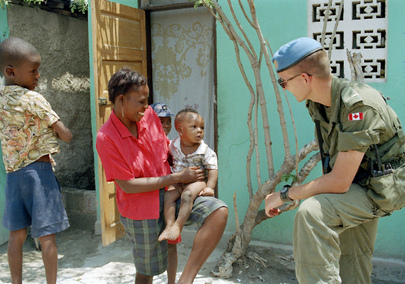Liberal myth-making
By Lorne Gunter, The Edmonton Journal
July 23, 2009
According to Maclean's magazine's website, Liberal leader Michael Ignatieff told an Irish university audience in 2005 that Canada's peacekeeping reputation was "entirely bogus." What's next, Ignatieff labelling multiculturalism "a complete sham"? Universal health care "an unmitigated disaster"? Bilingualism "an utter farce"?
The notion that Canada is a nation of peacekeepers, not soldiers, is one of those national myths -- like health care, multiculturalism and linguistic duality -- that the Liberals spent 40 years trying to manufacture. The peaceniks and flower children around Pierre Trudeau calculated that if they could convince the rest of us that Canada was without a warrior tradition, they could decimate our military and go around to international conferences boasting about how their commitment to peace made them morally superior to the Americans.
They also talked themselves into believing that if we had no war-making capacity -- that if we were a "soft power" -- the belligerents in the world's worst conflicts would trust Canada as the "honest broker" for their settlements.
Everybody now, put your hands together and sing Give Peace a Chance.
One thing got in the way of the Liberals' plans, though -- the professional resolve of our military.
Even as the Grits under Trudeau and later Jean Chrétien cut our military budgets and our troop strength by half and more, and subjected the men and women wearing Canada's uniform to such ridiculous experiments as unification -- in which all three branches of the military were rolled into one -- Canada's soldiers, sailors and air force personnel slogged on.
For decades without adequate equipment, with little respect and with almost impossible orders, they somehow managed to maintain our nation's reputation for top-notch soldiering. No one doubted that Canada's armed forces could do more with less than any military in the world, while at the same time retaining the respect of allies and foes alike.
Peacekeeping may not always have been what our forces thought was the best solution to conflict, but given that that was all their civilian masters were permitting them to do, they made the best of it.
They knew the world had always been a dangerous place -- and would always be dangerous, despite the Kumbaya spirit that had infected Ottawa -- but if they had to confront that danger only through a peacekeeping filter, then so be it.
In Bosnia in the mid-1990s, for instance, the rules of engagement set for our peacekeepers permitted them to return fire only when rounds fired at them by the warring factions came within a metre.
I can't imagine having to turn the other cheek, as it were, in the face of an enemy shooting at me within arm's-length. Still, our peacekeepers bore that obligation with pride and dignity and did their best to protect innocent people caught in the midst of the fighting.
In all, at least 114 Canadians have been killed while on peacekeeping duty around the world in the past half-century. It takes a special kind of bravery and dedication to one's country to go knowingly into hostile territory with one hand tied behind your back by politicians who only care when you foul up, who respect you very little and who always promise new equipment and resources but seldom follow through.
Having said all that, then, you'd expect I would be furious with Ignatieff over his remarks four years ago at the University of Dublin's Trinity College, and I am, in a way.
It was not the Canadian legacy of peacekeeping that was "entirely bogus," it was the Liberal misuse of that legacy that was. What was "disgusting" was the way the Chrétien government and then the Paul Martin government hid behind peacekeeping's skirts to avoid having to take sides in the world's hot spots.
It was a Liberal tendency, not a Canadian one, to, as Ignatieff added, rather "bitch about their rich neighbour to the south than actually pay" the price for a military that could intervene where needed to prevent humanitarian disasters.
Ignatieff's error in Ireland was to claim most Canadians were equally guilty of the irresponsibility and arrogance that were hallmarks of Liberal foreign policy for 40 years.
He should have blamed his own party -- not Canadians as a whole -- for the timidity whitewashed with moral boastfulness that was Canadian foreign policy from the late 1960s onward. And he should never, ever have said anything that could even remotely have been misconstrued as a slam on our peacekeepers.
The sole bright spot in Canadian foreign affairs during the Liberal era was the competence of our military despite the stresses the Liberals put them under.
Ignatieff also added, "If you are a human rights defender and you want something done to stop [a] massacre, you have to go to the Pentagon, because no one else is serious."
Iggy's unpardonable sin was in blaming our peacekeepers, indirectly, rather than placing blame where it belonged, with his own party.
Lorne Gunter writes for the Edmonton Journal.
© Copyright (c) The Ottawa Citizen





